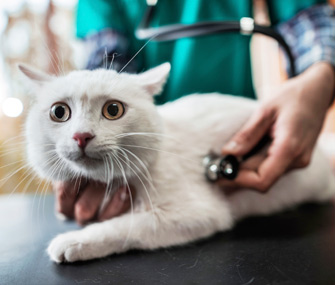Do you dread taking your cat to the veterinarian because it is such a stressful experience for you and your feline friend? We completely understand! Even Dr. Kim has a kitty who gets upset at the veterinary clinic. So she is going to tell you some tips and tricks for making your kitty’s experience at the vet a positive one.
Veterinary visits are so important for cats. Yearly visits are especially important in felines because they are excellent at hiding any problem from you. They are biologically designed to hide their problems. So things like tooth infections, intestinal issues, heart disease, arthritis, kidney disease, urinary problems, thyroid disease and lung disease can easily go un-noticed by the most loving and devoted pet parents. A thorough veterinary exam alone can pick up on so many of these issues in the early stages so we can treat them before they progress to more serious concerns.
The bottom line is that you should be taking your kitty to the vet EVERY YEAR to get an exam, period. If your vet finds a problem and your kitty needs other tests like bloodwork, urine or imaging (x-rays, ultrasound) it’s even more important to make sure they are happy at the vet! We want to make sure the visit is calm and serene so keep reading to see what you can do to make it happen!
First, you need to understand that when your cat gets upset at the veterinary hospital it’s only because they are scared. When they start to hiss, growl, bite or scratch it’s because they are fearful of being hurt and this is the only way they have to protect themselves. All the ideas we will share with you are designed to take their anxiety away as much as possible. If your kitty arrives happier and the visit is handled in the appropriate way then they won’t need to get upset.
It all starts at home. We all know this scenario….your cat has a vet appointment so you bring out THE CARRIER. Then…your cat disappears. This is the first place that you can help. Cats are very smart. They know that the carrier means the vet and the vet is scary. So how can you help? Make the carrier part of everyday life. Dr. Kim keeps her cat’s carrier in her bedroom closet and puts a soft kitty bed inside. She takes the door off so her cats can go in and out and use it as a hiding and resting place. That way when it’s time to take them to the clinic, she can put the door back on and they are actually happy to be in the carrier! This can be done with any carrier but another great product is the Sleepypod® Mobile Pet Bed. It is a pet bed that easily transforms into a carrier and is even crash tested! Watch the video here! If you are using a carrier you should always put something soft in it like a towel or preferably, your kitty’s favorite bed.
Make this carrier your kitty's regular bed at home! Vet visits will be a breeze!
The next thing you can do is use kitty pheromones. A mother cat secretes this to help her kittens relax and now you can use it to help your kitty relax! Feliway® is our favorite pheromone brand. It can be purchased in a spray or a wipe. The wipes come in individual packages which may be more convenient for a single visit. It is very important that you do not use the wipe directly on your kitty! You should wipe the inside surfaces of the carrier and the pet bed or towel that is placed in the carrier. They can be purchased here .
Use these pheromone wipes on the inside of the carrier and pet bed inside it!
After you have wiped the carrier with pheromones, put in your cat’s favorite kitty bed (or just change your Sleepypod® into a carrier) then you can actually cover the carrier with a small towel or thin baby blanket. Using a towel cuts down on visual stimuli that may add to your cat’s stress level. If the weather is very warm you should skip this step because you don’t want your kitty to overheat in the carrier.
You can even play special music in the car on the way to the vet! Harp music has been shown to soothe animals and decrease stress. The music will also help calm you down so you aren’t as stressed! Dr. Kim thinks Susan Raimond has done lovely work with this and her CDs can be purchased online here . Many other types of music can be found online for this purpose with a quick google search.
You can call ahead to the veterinarian to make sure that the doctor is running on time. If the doctor is running a little behind then you can arrive a little later so that you don’t have to wait in the lobby as long. Upon arrival, ask to be placed into an exam room as soon as possible. That way your kitty won’t hear the noises in the lobby or smell the other animals that might be there (dogs!). If you have to wait in the lobby pick a quiet corner away from other people and pets.
Once you get into the exam room Dr. Kim recommends leaving your kitty in the carrier until the nurse or doctor comes in. Unless of course your kitty is the social type and would prefer exploring! For most kitties it is much less scary to be in the quiet carrier.
Ask the nurse and doctor to do as much of the exam and tests IN THE EXAM ROOM and IN THE CARRIER as possible. With the Sleepypod® and many other carriers you can just take off the top so they don’t have to pull or “dump” your cat out - very stressful! Also, you should ask to be present if possible. Staying with your pet can be soothing for them. However, you should let the nurse and doctor hold your kitty for the exams and tests. You don’t want to risk a bite or scratch if they do happen to get grouchy. This is so important for safety. Many veterinarians are becoming Fear Free® certified. Dr. Kim is in the process now! Those veterinarians will already be employing these low stress handling techniques. They will often use towels to wrap your kitty if bloodwork is needed instead of scruffing your pet.
Look for this logo at the veterinary office you choose!
The last thing we need to comment on is a medication called gabapentin. If your kitty gets really stressed at the veterinarian despite the above techniques then you should ask your kitty’s doctor to send this home with you and come back a different time. Gabapentin has been proven as a very safe and effective way to decrease stress in cats at the veterinary clinic when given orally (either in a treat or pilled) at home prior to the visit. A great clinical trial was just released and can be found here. Trazodone is another medication that has been used very effectively for this purpose.
Ask your vet for this!
We hope that these tips and tricks have been helpful for you! As a holistic veterinarian decreasing stress and anxiety is of the utmost importance for Dr. Kim! This will not only help to improve your kitty’s anxiety but also their health and well-being by allowing a calm and serene yearly veterinary visit!
Dr. Kim regularly does house calls for acupuncture. These home visits eliminate the stress of the vet clinic but can still make your kitty nervous. Alot of these techniques can be employed at home visits too such as Feliway®, acupuncture in the pet bed and gabapentin if needed! To schedule an appointment please call 707-535-9979 today!






